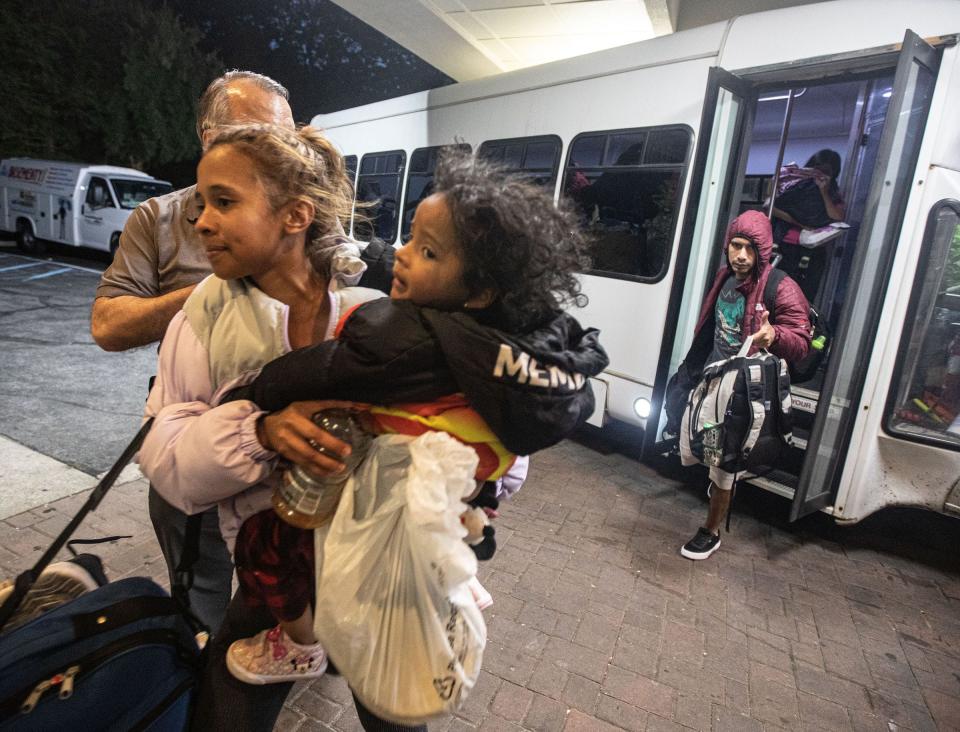Asylum seekers in NYC: Broome, Chemung among NY counties sued over emergency orders
New York City has filed suit against more than half of upstate counties, including Broome, Tioga and Chemung, seeking to rescind a spate of nearly identical executive orders issued last month in an effort to prevent the arrival of asylum seekers within their borders.
At least 35 upstate counties declared states of emergency in the days leading up to the expiration of Title 42, an early pandemic-era federal restriction that curbed immigration in the name of protecting public health.
Aimed squarely at New York City, where many of the migrants were expected to arrive, the executive orders prohibited local hotels, motels and other lodging establishments from contracting with municipalities beyond their respective county limits.
New York City’s lawsuit, filed June 7 in state court, decries the efforts of upstate county leaders to “wall off their borders” to migrants seeking refuge outside New York City’s overflowing shelter system as “premised on specious claims that the prospect of a few hundred asylum seekers sheltered at the City’s expense would somehow constitute an emergency imperiling public safety.”

Emergency orders called into question in NYC lawsuit
Fabian Levy, press secretary to New York City Mayor Eric Adams, said Thursday the city is pushing for expedited work authorizations for incoming migrants and that no immediate plans have been made to relocate people upstate beyond those who have already arrived in Westchester, Orange, Sullivan and Albany counties.
The lawsuit claims executive orders were issued “without any rational basis to believe that any kind of disaster, catastrophe or true emergency was taking place or about to take place in the relevant jurisdictions" and that they discriminated against a group of people based on nationality and immigration status.
The executive orders are also preempted by federal law, which “does not permit the unilateral imposition of residency restrictions upon noncitizens by local governments,” according to the lawsuit.

The suit alleges upstate county leaders acted “in excess of their jurisdiction and constitutional authority, in violation of lawful procedure, and and in a manner affected by an error of law that is arbitrary and capricious and an abuse of discretion.”
It further alleges executive orders “burden and obstruct New York City’s lawful and reasonable efforts to address this statewide humanitarian crisis in a manner that is explicitly permitted by law and required by this statewide emergency,” citing guidance issued May 10 by the Office of Temporary and Disability Assistance that confirms the city’s authority to provide temporary housing assistance in hotels rooms outside city limits.
More: Relocating asylum seekers in Broome would 'absolutely break our social services system'
NY counties point to lack of resources, communication
At his May 11 press conference announcing the emergency order, Broome County Executive Jason Garnar characterized New York City Mayor Eric Adams’ communication on the matter – based on a conference call that morning between Adams and more than 175 upstate elected officials – as sudden and “lack[ing] a lot of very basic information that you would expect to be given” in such circumstances.
Adams said he'd sent an email to local leaders a week earlier seeking their assistance in addressing the sudden influx of migrants.
“We are asking for your cities and towns to share this responsibility of providing shelter to asylum seekers who have already arrived in NYC and to those expected to arrive in NYC in the coming months,” Adams wrote, providing a City Hall email address for additional inquiries.
Garnar said he does not recall receiving the email from Adams, and offered that such an urgent communication should have been delivered in a more immediate manner. Chemung County Executive Chris Moss issued a similar emergency order in May, and said at the time the county "could not sustain the resources needed which coincide with migrant relocation." Moss did return recent requests for comment.
Steuben County opted not to issue an emergency declaration unless plans were made to send people to the area.
Citing state law that requires “specific thresholds” for an emergency to be declared, including the presence of “an immediate danger,” Steuben County officials said an emergency declaration would be "improper" at the time, but said the county "lacks the infrastructure to support a large influx of a temporary homeless population."
Levy said the city intended to indefinitely cover the expenses related to sheltering, feeding, transporting and providing social services for people relocated outside city limits.
“In my experience working in government, there’s no such thing as ‘indefinite,’” said Garnar. “Budgets always have an upper limit, and I’m not sure how the city plans to fund these expenses indefinitely.”
This article originally appeared on Binghamton Press & Sun-Bulletin: Southern Tier counties among those targeted in NYC mayor's lawsuit

 money
money 